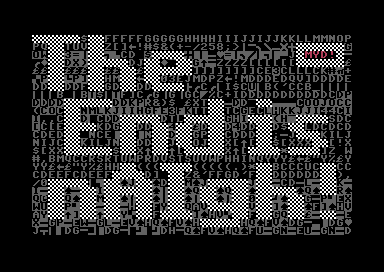|
| |
Released At :
Wired AI Ninja Compo 2023
Achievements :
C64 Demo Competition at Wired AI Ninja Compo 2023 : #2
Credits :
SIDs used in this release :
Download :
Look for downloads on external sites:
Pokefinder.org
Summary
Submitted by spider-j on 25 December 2023
Scrolltext:
The End is nAIgh!
The Luddites were members of a 19th-century movement of English textile workers
which opposed the use of certain types of cost-saving machinery, often by
destroying the machines in clandestine raids. They protested against
manufacturers who used machines in "a fraudulent and deceitful manner" to
replace the skilled labour of workers and drive down wages by producing inferior
goods.
Many Luddite groups were highly organized and pursued machine-breaking as one of
several tools for achieving specific political ends. In addition to the raids,
Luddites coordinated public demonstrations and the mailing of letters to local
industrialists and government officials. These letters explained their reasons
for destroying the machinery and threatened further action if the use of
"obnoxious" machines continued.
One of the first major contemporary anti-technological thinkers was French
philosopher Jacques Ellul. In his The Technological Society (1964), Ellul argued
that logical and mechanical organization "eliminates or subordinates the natural
world." Ellul defined technique as the entire totality of organizational methods
and technology with a goal toward maximum rational efficiency. According to
Ellul, technique has an impetus which tends to drown out human concerns: "The
only thing that matters technically is yield, production. This is the law of
technique; this yield can only be obtained by the total mobilization of human
beings, body and soul, and this implies the exploitation of all human psychic
forces."
Neo-Luddism calls for slowing or stopping the development of new technologies.
Neo-Luddism prescribes a lifestyle that abandons specific technologies, because
of its belief that this is the best prospect for the future.
In 1990, attempting to reclaim the term 'Luddite' and found a unified movement,
Chellis Glendinning published her "Notes towards a Neo-Luddite manifesto". She
argues in favor of the "search for new technological forms" which are local in
scale and promote social and political freedom.
Feeding an AI system requires data, the representation of information. Some
information, such as gender, age and temperature, can be easily coded and
quantified. However, there is no way to uniformly quantify complex emotions,
beliefs, cultures, norms and values. Because AI systems cannot process these
concepts, the best they can do is to seek to maximize benefits and minimize
losses for people according to mathematical principles. This utilitarian logic,
though, often contravenes what we would consider noble from a moral standpoint —
prioritizing the weak over the strong, safeguarding the rights of the minority
despite giving up greater overall welfare and seeking truth and justice rather
than telling lies.
The fact that AI does not understand culture or values does not imply that AI is
value-neutral. Rather, any AI designed by humans is implicitly value-laden. It
is consciously or unconsciously imbued with the belief system of its designer.
Biases in AI can come from the representativeness of the historical data, the
ways in which data scientists clean and interpret the data, which categorizing
buckets the model is designed to output, the choice of loss function and other
design features. A more aggressive company culture, for example, might favor
maximizing recall in AI, or the proportion of positives identified as positive,
while a more prudent culture would encourage maximizing precision, the
proportion of labelled positives that are actually positive. While such a
distinction might seem trivial, in a medical setting, it can become an issue of
life and death: do we try to distribute as much of a treatment as possible
despite its side effects, or do we act more prudently to limit the distribution
of the treatment to minimize side effects, even if many people will never get
the treatment? Within a single AI model, these two goals can never be achieved
simultaneously because they are mathematically opposed to each other. People
have to make a choice when designing an AI system, and the choice they make will
inevitably reflect the values of the designers.
Take responsibility, now.
|
|
|
|
 | Search CSDb |
|
 | Navigate |  |
|
 | Detailed Info |  |
|
 | Fun Stuff |  |
· Goofs
· Hidden Parts
· Trivia (1)
|
|
 | Forum |  |
|
 | Support CSDb |  |
|
 |  |
|


